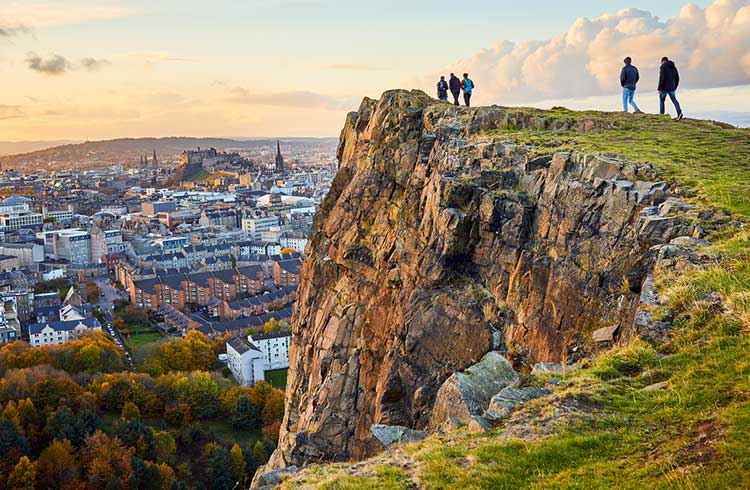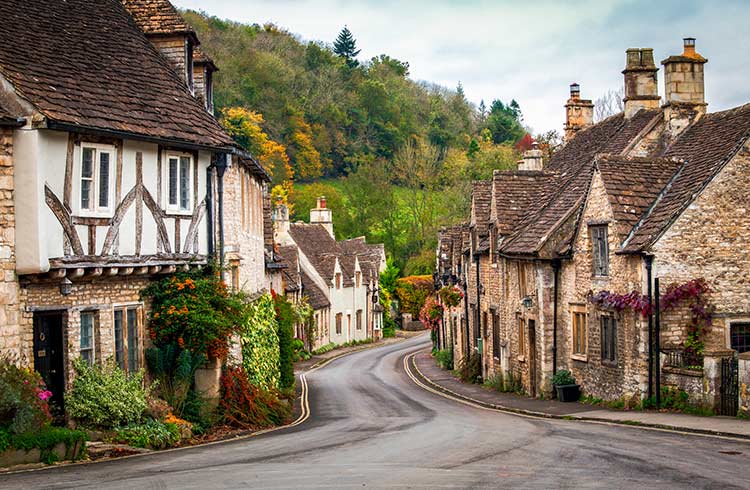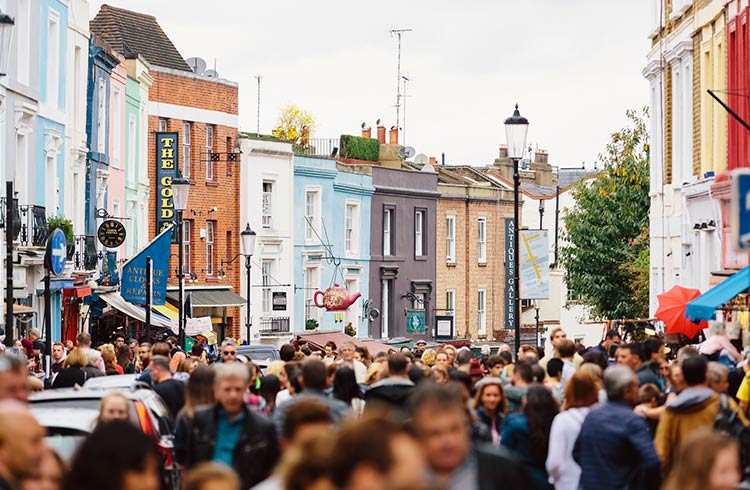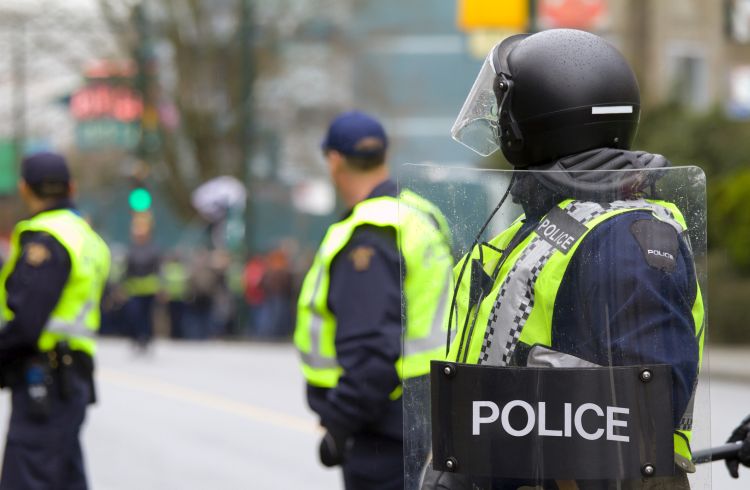Is Scotland Safe? Essential Travel Tips for Visitors
Just how safe is Scotland? Melody Wren shares her travel safety tips on crime, unpredictable weather, safety in the mountains and what to pack on a hiking trip.
 Photo © Getty Images/Andrew Merry
Photo © Getty Images/Andrew Merry
Scotland is one of the most scenic countries I have visited. In the cities of Edinburgh and Glasgow there is a rich cultural scene with museums, music and great restaurants. When you get away from the cities, there is some of the most beautifully rugged scenery anywhere in the world.
As a whole, Scotland is a relatively safe country to visit, but as with any place, you have to be careful in certain areas and situations. The Government is committed to keeping Scotland safe, and reports that crime has been on a downward trend for the past 10 years, and are at their lowest levels in more than 45 years.
Here are a few travel safety tips I picked up along the way to have a safe trip to Scotland.
- Safety in Edinburgh and Glasgow
- Cash vs cards in Scotland
- Travel scams in Scotland
- Driving safety tips
- Safety on Scotland’s ferries
- Freedom to roam in Scotland
- Stay safe in Scotland’s mountains
- Unpredictable weather
- Isolation in the north of Scotland
- What to pack for a hiking trip in Scotland
- Waves and swells in the North Atlantic
Safety tips for Edinburgh and Glasgow
Edinburgh and Glasgow have the highest rates of crime in the country due to gang-related activities. As you would in any large city, use your street smarts.
Always leave your passport in your hotel safe, and carry a photocopy of it when you leave the room. Keep large amounts of cash and any other valuables in your hotel room safe.
It’s been reported that pickpocketing groups work together to distract and steal in several areas of Edinburgh and Glasgow. If you are traveling with friends, split your money between you, so if one of you gets robbed, the others still have money available.
In Edinburgh, be especially on the lookout for pickpockets in Edinburgh Old Town, Edinburgh Castle, Royal Mile, The Royal Edinburgh Military Tattoo, Princes Street Gardens, St Giles’ Cathedral, Edinburgh Zoo, and Edinburgh International Events.
In Glasgow, watch out for pickpockets on Buchanan Street and at Barras Weekend Market.
While enjoying a night out in Aberdeen, Edinburgh or Glasgow, the following areas can become disorderly primarily due to drunk and disorderly behavior, and the odd fight, once the bars let out between 2 and 3am:
- Lothian Road, Edinburgh
- Dalry Road, Edinburgh
- Sauchiehall Street, Glasgow
- Hope Street, Glasgow
- Clyde Street, Glasgow
- Union Street, Aberdeen
You might want to avoid the red-light district between Edinburgh’s Salamander Street and Leith Links and stay away from The Meadows alone at night as there is an assault in the park about every two weeks.
Other areas to avoid completely (day or night) are Glasgow’s Possil and Springburn areas, where gang-related incidents can occur.
Cash vs cards in Scotland
While cards are widely accepted in larger communities and cities, don’t assume that smaller Scottish villages will take credit cards. Be prepared so you aren’t caught short without money for food or accommodation.
Travel scams in Scotland
I have experienced scams in many countries, but the most commonly reported scams in Scottish cities are ones I haven’t heard of before:
- Fake tickets, most commonly found in Edinburgh: you may have paid for a ticket online and it is never sent to you, or you are sent a fake ticket. Stick to buying tickets directly from the company or official counters.
- The Gold ring scam: a gypsy will find a gold ring on the floor and offer it to you, pointing out the ‘18k’ stamp on it (it is actually worthless, polished brass). Claiming their religion forbids them to keep the ring, they will suggest you give it to a family member as a gift. If you accept the ring, they will ask you to spare money or an accomplice will steal from you while you’re distracted.
- Fake police: you are approached by someone claiming to be a tourist who asks you to take their photo. Soon, police officers arrive and ask to do a routine check of your belongings. The supposed ‘tourist’ will comply and encourage you to do so. If you have any valuables on you they will be stolen while you are distracted. Never show your passport, only show a copy. If someone claims to be a police officer, ask to see their badge and let them know you’re going to call the police station to verify their badge numbers. If they are frauds, they will give up and walk away.
- Fraudulent tour operators: if you see tour prices that are ‘too-good-to-be-true’, they usually are. Don’t pay for a tour with cash or via money transfer. Stick to reputable tourism websites, and check to make sure you have not been redirected to a third-party website to enter payment information. Check that the website connection is secure, check the grammar on the website. Legitimate websites have contact details available, as well as customer reviews.
Is it safe to drive in Scotland?
In Scotland, driving is on the left side of the road. Remember this while you drive your rental vehicle out of the shop, and especially on quiet country roads. Here are a few other road trip tips:
- If you’re renting a car, the minimum age for car rental in Scotland is 23, and the maximum age is 65.
- Never drink and drive. If you are driving the Malt Whiskey trail, consider hiring a driver or one of your passengers will need to refrain from drinking
- Sheep, mountain goats and cattle often obstruct traffic, so be prepared to slow down or stop suddenly, and often wait some time before a flock or herd decides to move along
- Smaller single lane roads in the Highlands are potentially dangerous, and the area is crisscrossed by single-lane roads which twist and turn. Drive slowly when you near blind-corners, just in case someone is coming from the opposite direction.
- Police Scotland recommend not driving in icy or snowy conditions unless it’s essential
- If you must drive in these harsh conditions, leave at least 10 car lengths between you and the car in front in case you have to stop suddenly
- In winter, always carry an emergency kit containing a scraper, de-icer, flashlight, first aid kit, jumper cables, shoves, a warm drink and emergency food in case you get stuck or break down.
Safety on Scotland’s ferries
Scotland has a variety of ferry services that are a vital lifeline for island residents, and are a fun way to explore the more remote outer islands. Caledonian BacBrayne, locally known as CalMac, has ferries that travel to more than 20 island destinations.
Scotland ferries were once poorly maintained and unsafe for passengers, but the government has put in place a very thorough plan to maintain safety on passenger ferries and passengers.
There are mobile apps that provide timetables for ferries and the likelihood of disruptions. Disruptions are frequent from October to March due to severe weather, with ferries being delayed or completely cancelled.
Traffic Scotland suggests that if there is a storm or high winds, check with the ferry operator to confirm services are running.
Freedom to roam in Scotland
Scotland’s ‘Freedom to Roam’ policy means you can hike anywhere – as long as you respect the interests of people, take responsibility for your actions and care for the environment.
Don’t wander aimlessly. If you go hiking on your own, let someone know where you are going and your timelines. Never hike further than you can navigate your way back if the weather turns quickly.
Don’t go near the deer during rutting season from September to November, as stags will come after you.
Stay safe in Scotland’s mountains
Perhaps the biggest danger travelers to Scotland are likely to encounter will be if you explore its many mountains. Never hike on your own, and check the weather for a forecast of heavy rain or wind before you go. The Scottish Highlands are the wettest in the United Kingdom, and can get up to 118” of rain in a year.
Always tell someone where you are going and when you expect to be back, and always study the route you are hiking in detail. It’s also vital that you ensure your group is fit for the walk, and at least one person has the ability to use a map and compass accurately in mist, darkness and severe weather.
If the weather has a forecast of heavy rain, snow or extreme gusty winds, consider rescheduling your hike. Monitor the weather conditions for the days you plan to hike, and if, while hiking, the weather turns ugly, be prepared to turn back.
Be prepared for Scotland’s unpredictable weather
In the country and coastal areas, locals will tell you to a) never trust a blue sky b) never trust a cloudy sky.
Expect to experience four seasons of weather in one day.
During fall (end of September to November) and spring (late March to May), the weather is less predictable with a chance of heavy of rain and/or high winds. Pay attention to weather forecasts so you’re aware of any changes, and always listen to the locals. Weather is always a hot topic.
Isolation in the north of Scotland
In the north of Scotland, there are many areas of total isolation. If you are injured or need help in this region, there is little chance of cellphone signal or medical help.
If you are going on your own, always tell someone exactly when you are going and where you are going. If you parked a car nearby, leave a note on your car with the time you left. Pack extra layers for the outdoors, because the weather could turn from sun, rain, sleet and fog and back to sun in a four-hour period.
Take the usual outdoor safety precautions and bring snacks and water in case you do get stranded or delayed.
What to pack for a hiking trip in Scotland
- Waterproof jacket and trousers
- Warm trousers and a fleece
- Gloves and a hat
- Gaiters: they strap over a hiking boot and around your leg to give you protection from branches and thorns and to prevent mud, water or snow from getting in your footwear
- Sturdy walking boots
- Headlamp or flashlight
- Map (get the most up to date map, and protect it from the weather)
- Compass
- Whistle
- Spare food
- Small First Aid kit
- Mobile phone and charger.
Waves and swells in the North Atlantic
Be careful near the coast and don’t stand too close to the water. Stay in a safe place where you can leave if you see a large swell coming. These unexpected swells are dangerous and have resulted in the deaths of people surprised by large waves and swept away. The waves might not be big, but large swells can come out of nowhere in the North Atlantic.
Overall, Scotland is a safe place to travel. Just keep an eye on the weather, and if you’re traveling during winter be flexible with your plans.
Related articles
Simple and flexible travel insurance
You can buy at home or while traveling, and claim online from anywhere in the world. With 150+ adventure activities covered and 24/7 emergency assistance.
Get a quote


13 Comments
You should add to your list of places to avoid whilst in the capital city, Kirkgate Leith due to the amount of alcoholics that frequent the area day and night! Places not to venture at night: Carlton hill, rose street, salamander street, Leith links park, the footpath from St leonards to Bingham (via Arthur seat) Magdeline, Peirshill (holyrood side) the footpath from the Scottish parliament along to easter road, Lochend/craigintinny high amount of junkies!
You should add to your list of places to avoid whilst in the capital city, Kirkgate Leith due to the amount of alcoholics that frequent the area day and night! Places not to venture at night: Carlton hill, rose street, salamander street, Leith links park, the footpath from St leonards to Bingham (via Arthur seat) Magdeline, Peirshill (holyrood side) the footpath from the Scottish parliament along to easter road, Lochend/craigintinny high amount of junkies!
Partick is not a housing estate and is a very popular and safe place to visit in Glasgow’s west end.
Is this a parody? The area between central station and st Enoch square in Glasgow Just has a McDonald’s, a bank and a Pizza Hut. In “areas to avoid” most of them are a load of rubbish, Who wrote this? Lothian Road is perfectly safe, full of cinemas and restaurants, the grass market is safe too. Scotland is probably one of the safest countries in the world, you are very unlikely to get stabbed or assaulted by bouncers - very strange.
TBH, the list of "no-go" places is significant and makes Scotland sound like the dodgier areas of Los Angeles, Detroit or the Bronx. Either the article is FOS or Scotland is way more dangerous than I had imagined.
I have travelled to Scotland many times and have always found the people there to be very friendly. The best form of self defence in Scotland in my opinion is treating others with respect.
For the comment stating you are very unlikely to be assaulted or stabbed in Glasgow is just naive and not true . Although it has improved you should still avoid these stabbing/gang hotspots : Drumchapel,Gorbals,Calton,Easterhouse,
Possil,Springburn,Govan,Castlemilk,Blackhil
Bridgeton. Etc. Also Scotland was the most violent country in the developed world / Murder Capital of Europe , so definitely not safest. Avoid these areas and stick to the city centre/west end and you should be fine . Also avoid walking alone after dark . Also if you venture out into Glasgows neighbouring areas avoid : Greenock,Port Glasgow,Cumbernauld,Saltcoats,Ardrossan,Irvine,Largs. Should note Largs is safe if you stick to the affluent front of the town, when you move back towards the scheme ( Council Estate ) violence and stabbing/slashings aren't uncommon.
Native-born Glaswegian speaking. In Glasgow you'd have to be looking pretty hard to wander into an ''iffy' area at night. You have no reason as a tourist to go anywhere near Easterhouse, Castlemilk, Drumchapel, Pollok or Possilpark so you won't go there at all. Partick is no more dangerous than many other parts of Glasgow and in fact is close enough to the university quarter to be relatively safe at night. Govan has nothing of great interest for a tourist - OK not much - so again you needn't stroll there of an evening. The one area I'd mention is the part between the Citizens' Theatre and Bridge Street subway station which can seem rather intimidating at night to a first-time visitor. Just keep your wits about you (and avoid the McDonalds in Argyle Street late at night) and you'll be fine. And welcome to my city !
My son and I are headed to Scotland for the Fringe fest. I was wondering how to set up some f the travels to the castle and such. Do I set it up when I get there or do I set the excursions up before we get there?. We do know one person there should he drive us around also if i need to go by myself are the busses safe for travel?
Glasgow is a very safe city, the city centre is extremely safe at any time. There will be rowdy drunk people all over the place at night but will be in good spirits. Even in the rare event someone is randomly looking for a fight as soon as they realise you are not Scottish they will become your best friend.
Stabbings and violence is contained in the housing schemes outside of the city centre and between rival gangs/people who have previous issues with each other. There is no reason for any visitors to go near these areas and even if they mistakenly do the threat of violence or muggings will be extremly rare, most people you come across will help you get to an area you are looking for.
NEDS are a dying breed in Glasgow and rarely visible now, young peole no matter were they come from are more intersted in fashion, haircuts,the gym and looking good now, Glasgow has a higher standard of living than ever before and young people are taking advantage of it and enjoying life rather than being pests.
Glasgow has its issues with drugs and alcohol, the people involved keep themselves to themselves even beggers are polite if you decline to give them money, they will wish you a good day.
You will not have any issues with bouncers if you are polite, respectable and not too drunk
Glasweigans are very respectable to tourists and will go out their way to make them feel welcome. If you look for trouble in Glasgow you will get it from anyone, but it wont find you.
As for Celtic and Rangers playing against each other, it will be busy and rowdy but there will be a heavy police presence, there may be flash points when the two sets of fans come together but agaian the police will disperse it and it will be rare to see.
Ensure when dealing with people who live up there….
a) If you go that extra mile and do them a favour, never expect anything in return. You’ll be waiting for a very long time.
b) If empty promises are what you’re looking for, be really nice and very generous with them.
c) A friend up there is a friend for several minutes.
"Relatively safe"? Perhaps, you should get some who knows what they are talking about when writing articles, and maybe someone who how comparative adverbs work. Scotland is not "relatively" safe, it's a first world nation in Northern Europe. A relatively safe country would be one which is safe compared to more dangerous neighbours, England, Ireland, Wales and France and Norway are not war zones.I agree with the person who thought this was parody.
Glasgow born , Canada raised. Have been home many, many times. Have family in Drumchapel, Maryhill, Castlemilk and other so called "dangerous" areas of Glasgow. We even stayed in Springburn at the Red Road Flats on one visit. Never been accosted or felt threatened or unsafe in any of those areas. As a teen my cousins and I often came home to Drumchapel on public transport from the town unscathed.Yes there were gangs but unless you were a member of a rival gang you could walk their territory untouched. When we were in the Red Road Flats it was a laugh to see the bus load of Glesga Grannies disembark the bus for the bingo and walk through the gangs hanging around the hall. They parted ways for these ladies and did not bother them at all. The city I live in Canada,Winnipeg, has the reputation as the murder capitol of Canada. It has the same kind of social problems you will find in Glasgow and any other large city. I felt safe walking the streets of Glasgow even at night. There are places in Winnipeg where I would not do the same. Also been to Edinburgh numerous times and never had a problem.